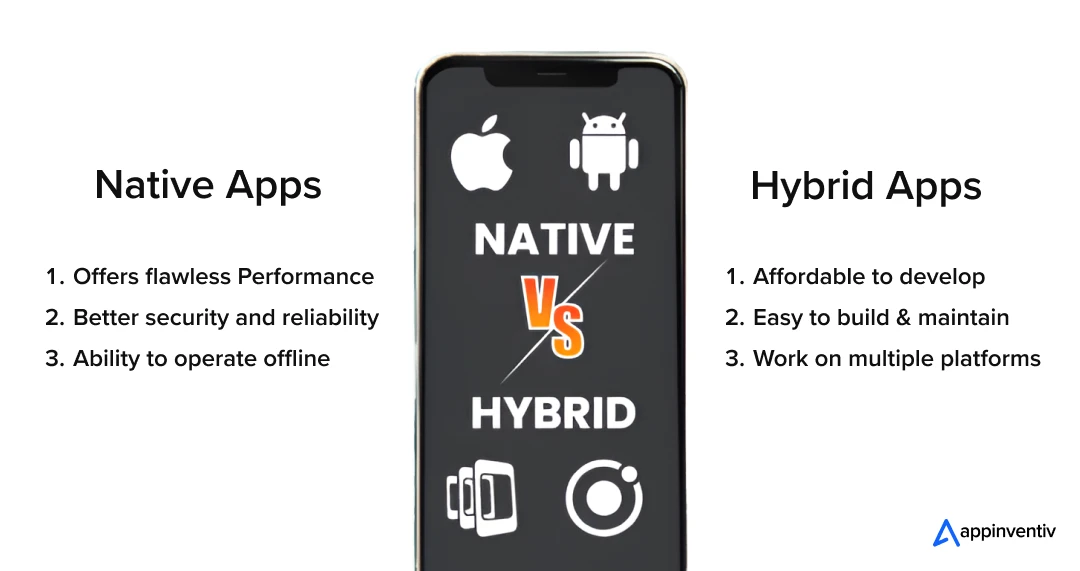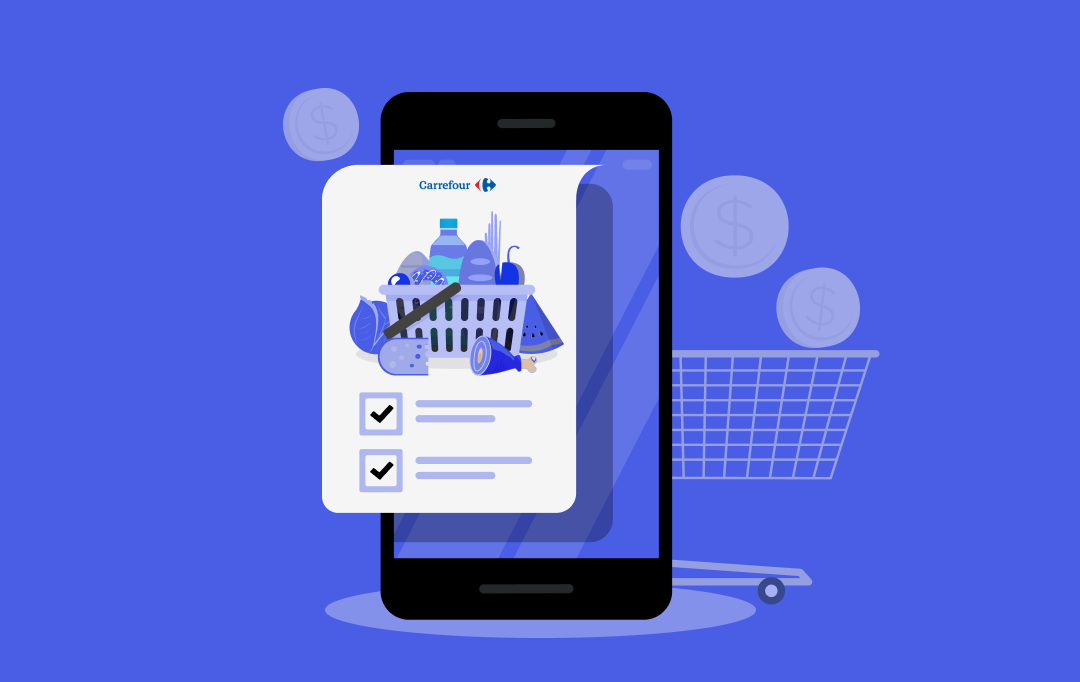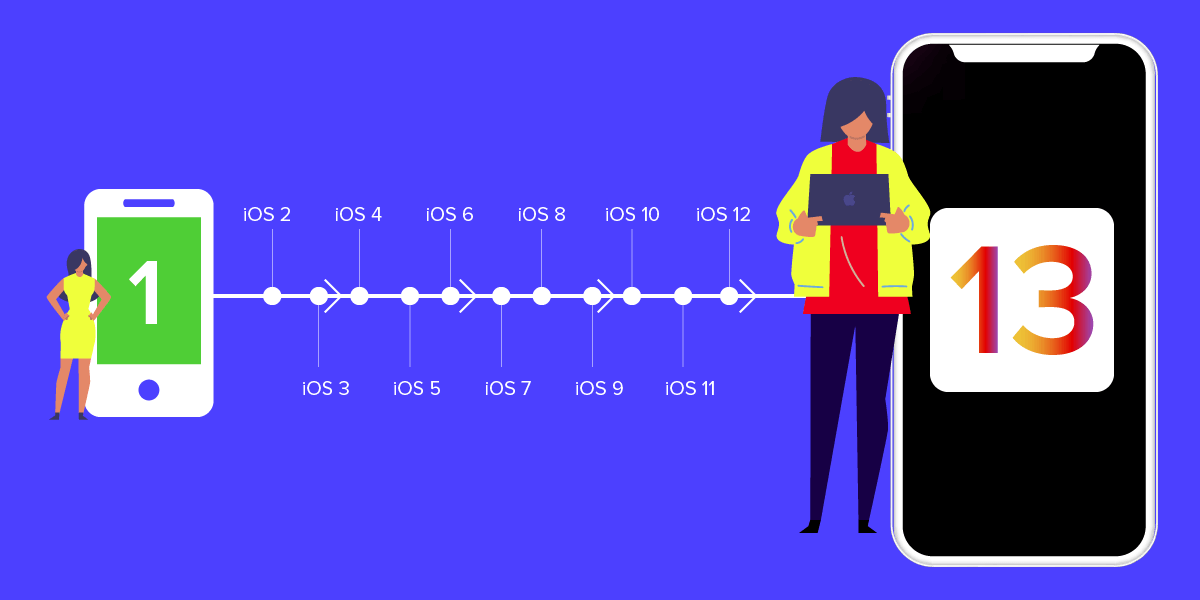- How Native and Hybrid Apps Align with Business Objectives
- Native Apps
- Hybrid Apps
- Understanding Native Mobile App Development
- Key Features of Native App Development
- Examples of Native App Development
- Benefits of Native App Development
- Cons of Native App Development
- Understanding Hybrid App Development
- Key Features of Hybrid App Development
- Examples of Hybrid App Development
- Benefits of Hybrid App Development
- Cons of Hybrid App Development
- In-Depth Analysis: Native vs Hybrid App Development for Business Success
- 1. Platform Compatibility
- 2. Performance
- 3. User Experience (UX)
- 4. Development Cost and Time
- 5. Scalability and Maintenance
- 6. Security
- Beyond the Code: Partnering with Appinventiv for Your Mobile Vision
- FAQs
Key takeaways:
- Native apps run better, and users notice the difference. This especially matters for graphics-heavy or data-intensive applications. The downside is you’re building two separate apps for iPhone and Android.
- Hybrid apps let one development team handle everything. This keeps costs down and speeds up launch timing. Performance sometimes suffers, though.
- Bigger companies with serious budgets usually choose native for long-term projects. Smaller teams often start with hybrid to test their concepts first.
- It comes down to your priorities. Do you need maximum performance, or are you stretching budget and timeline constraints?
Your app idea could change everything in your field, and you’re excited to start building. Then reality hits: Should you build native or go hybrid? This decision catches tons of entrepreneurs off guard, and after seeing companies struggle with this choice for years, we understand the confusion. Native versus hybrid development depends on what actually matters for your specific situation.
Native apps get built for one platform at a time. They run faster, look better, and users love how they feel. The problem is, you’re basically building two separate apps if you want iPhone and Android versions. That means double the time, double the cost, double the headaches.
Hybrid development takes a different approach. You build once, it works everywhere. Sounds perfect, right? Well, sometimes these apps feel a little clunky compared to native ones. Users might notice the difference, especially if they’re picky about performance.
Which route makes sense for your business? It depends on your priorities, timeline, and how much money you want to spend. Let us break down what each option actually means for real companies trying to build successful apps.
How Native and Hybrid Apps Align with Business Objectives
When building an app to support your business, deciding between native and hybrid app development is crucial. Each approach has its strengths, and understanding how they align with your specific business objectives can make the decision easier. Here’s how both options fit various business needs:

Native Apps
Native apps work best when you absolutely need the smoothest possible user experience and can’t compromise on performance. These get built for just one platform—either iPhone or Android—so they take full advantage of what that specific device can do. You’ll want native development when:
- Your app does complicated stuff like gaming or advanced shopping features that need serious processing power.
- Speed matters more than anything else for your users.
- You need to tap into phone hardware like cameras, location tracking, or other sensors in sophisticated ways.
- Your app needs to handle tons of users and data without slowing down.
Companies planning for serious long-term growth love native apps because they’re easier to expand and improve over time. Just remember that native development costs more money and takes longer to finish, so they make sense when you’re willing to invest heavily in creating something that really stands out from competitors.
Hybrid Apps
Hybrid app vs native app comes down to two things most of the time: what you can afford and when you need it done. Hybrid makes sense when you’re trying to launch fast or your budget isn’t huge. Why build two separate apps when you can make one that runs on iPhones and Androids? Hybrid apps are best for:
- Startups or businesses that need to quickly launch a Minimum Viable Product (MVP).
- Apps where content delivery is key (e.g., blogs, informational apps).
- Businesses that want to test new ideas in the market without a huge initial investment.
Sure, hybrid apps won’t run as smoothly as native ones, but they work fine for basic apps that don’t need fancy phone features. Think business tools, news apps, or anything that just shows information to lots of people without doing complicated stuff.
So, without further ado, let’s begin by understanding Native and Hybrid apps in detail.
Understanding Native Mobile App Development
Native mobile app development is creating applications designed to work on specific devices and mobile platforms, such as Android and iOS. These apps are carefully crafted to meet the requirements of a single operating system, using programming languages that are specific to them. This allows for the creation of intuitive apps that are backed by interactive designs and functionalities.
Native mobile app development involves harnessing the native programming language of the chosen operating system, such as Java or Kotlin for Android and Objective-C or Swift for iOS, and developing an app finely tuned for a single platform. Whether destined for desktops, smartphones, smart TVs, or other advanced digital gadgets, native development ensures an optimal user experience and an aesthetically pleasing UI/UX.
By choosing native development, businesses can harness the full power of their platform, ensuring a seamless and responsive app experience.
Key Features of Native App Development
Native development means your app can actually use everything the phone was built to do. Modern devices pack incredible technology, and native apps tap into all of it instead of just scratching the surface.
- Speed That Actually Matters: These apps don’t need to translate commands through multiple software layers. When someone taps something, it responds immediately. Games and AR apps especially need this kind of responsiveness.
- Hardware Integration: Want to use the camera for something sophisticated? Need precise location tracking? Fingerprint authentication? Native apps connect directly to these components without workarounds.
- Design That Feels Right: iPhone users expect apps to work like other iPhone apps. Android users have different expectations. Native development lets you meet those specific expectations instead of creating generic interfaces.
- No Feature Limitations: Every notification system, background process, or location service works exactly as intended. No compromises or missing capabilities.
- Growth Without Problems: When your user base expands or features get more complex, native architecture handles the increased demands reliably.
With tools like Android Studio, Xcode, Swift, and Java, developers can create high-performance apps that make the most of each platform’s capabilities.
Examples of Native App Development
Native apps are designed to fully leverage platform-specific features, ensuring optimal performance and user experience. Here are some well-known examples that showcase the benefits of native app development:
- Spotify: Provides seamless audio streaming and offline functionality, optimized for both iOS and Android.
- WhatsApp: Ensures smooth messaging and real-time notifications with deep device integration.
- SoundCloud: Delivers high-quality audio and smooth playback, taking full advantage of device capabilities.
- Google Maps: Offers real-time navigation and offline maps, leveraging GPS and device sensors for accurate results.

Benefits of Native App Development
With features and examples already discussed, let us help you determine the multiple benefits of Android and iOS native app development process below:

Lightning Fast Performance
Native apps load faster because they don’t waste time translating code between different systems. Everything gets optimized for that specific device, so when users tap buttons or swipe screens, things happen instantly. Startups often choose native development because the performance benefits justify the investment.
Works Without Internet
One huge advantage – these apps keep working even when your phone loses signal. Users can access most features during flights, in remote areas, or when data runs out. This reliability becomes crucial for apps that people depend on daily, regardless of their internet situation.
Feels Natural to Use
Native apps follow the design rules that users already know from their phone’s operating system. iPhone apps behave like other iPhone apps, Android apps feel like Android. This familiarity means people figure out how to use your app faster and feel more comfortable with it.
Fewer Technical Problems
Building one app for one platform means developers don’t juggle multiple systems simultaneously. Less complexity equals fewer bugs, crashes, and weird behaviors that frustrate users and damage your reputation.
Optimal Performance
Cloud native full cycle app development for a specific platform ensures optimized performance. Since the apps are tailored to a particular operating system, they exhibit responsiveness and exceptional speed. When it comes to native vs hybrid app development, native apps usually take the upper hand as they can leverage core programming languages and APIs that contribute to their overall efficiency.
[Also Read: Is Cloud Native Application Protection Platform The Answer To Security Woes]
Elevated Security
Native Android app development relies on multiple technologies, such as HTML5, JavaScript, and CSS, which can enhance overall user data protection. One of the most sought-after native app development benefits, the emphasis on security ensures the safeguarding of user data, making native app development a reliable development approach.
Cons of Native App Development
Here are the multiple cons of hybrid app development:
Limited Code Reusability
Creating separate native apps for iOS and Android requires individual coding and development efforts, resulting in a significant amount of time, resources, and costs. This contrasts hybrid or cross-platform app development that allows code reusability across different platforms.
High Maintenance
When it comes to hybrid vs native app development, the latter usually requires substantial maintenance expenses, which usually exceed the initial development investment.
Intense Talent Demand
Native mobile apps, due to their language-specific nature, require developers who are proficient in the specific programming languages of each platform. Now, hiring this kind of specialized talent can prove challenging. On the other hand, it is relatively easy to assemble a single cross-platform development team.
| Benefits | Cons |
|---|---|
| Swift Speed: Fast performance with preloaded elements. | Limited Code Reusability: Separate codebases for iOS and Android. |
| Seamless Offline Functionality: Works without an internet connection. | High Maintenance: Requires separate updates and higher costs. |
| Intuitive Interactivity: Optimized UX for specific platforms. | Intense Talent Demand: Requires platform-specific expertise. |
| Reduced Error Potential: Fewer bugs due to single codebase. | |
| Optimal Performance: Tailored for speed and efficiency. | |
| Elevated Security: Enhanced data protection due to platform-specific technologies. |
In our debate on native vs hybrid mobile app development, let’s now move ahead and examine the multiple pros, cons, and examples of hybrid app development to gain a better understanding of the development approach.
Understanding Hybrid App Development
Hybrid mobile development lets you build apps using standard web programming that work on different devices. You write code once using HTML, CSS, and JavaScript, then wrap it so it functions like a regular phone app. The same application runs on Android phones, iPhones, and websites without rebuilding everything from scratch.
Most development teams choose frameworks like React Native, Flutter, Ionic, or Xamarin to handle the technical complexities. Instead of hiring separate teams for each platform, one group of developers can create apps that work everywhere. This cuts both development time and project costs substantially.
Companies that need to launch quickly find this approach appealing. You can get your app into both app stores without the expense of building two completely different applications.
Must Read: Guide to Javascript Framework
While hybrid apps may not match native apps in performance, they strike a balance between functionality and cost-efficiency.
Key Features of Hybrid App Development
Features of hybrid app development allow businesses to access device capabilities through plugins and specialized interfaces, making them suitable for various application types. Modern frameworks like React Native and Flutter have improved significantly, enabling hybrid apps to provide quality user experiences across different devices.
- Device Access: Hybrid applications can utilize essential phone features including camera, GPS, and storage through plugin architectures. This gives businesses comprehensive functionality without creating separate applications for each platform.
- Cost Efficiency: Single codebase development reduces development and maintenance costs considerably. Companies with budget constraints often select hybrid approaches instead of more expensive native development options.
- Scalable Architecture: While hybrid apps may not match native performance levels, they support business expansion effectively. Updates and new features deploy across all platforms simultaneously, maintaining consistency while minimizing additional development effort.
Frameworks such as React Native, Flutter, and Ionic provide businesses with adaptable, cost-effective solutions for building cross-platform applications. These tools deliver reasonable performance without requiring separate development teams for each operating system.
Do Read: React Vs. Ionic (Which Framework To Choose)
Examples of Hybrid App Development
Here are some notable hybrid app examples that highlight the benefits of this approach:
- Instagram: Integrates camera functionality and social features, delivering a smooth experience across iOS and Android.
- Amazon App Store: Provides a consistent experience for browsing, purchasing, and downloading apps, with native capabilities like push notifications.
- Twitter: Offers seamless browsing and real-time interaction on both platforms, ensuring consistent performance.
- Gmail: Combines web-based elements with native features such as offline access and push notifications, making email management efficient.

Benefits of Hybrid App Development
Hybrid app development is one of the most common choices for modern businesses considering its distinctive advantages. Let us look at the multiple benefits of hybrid app development process in detail below:

Accelerated Time to Market
For startups that wish to swiftly launch a Minimum Viable Product (MVP), hybrid mobile application development is one of the beneficial approaches. This framework expedites app development and offers a faster time to entry, all thanks to its early-stage deployment.
Simplified Maintenance
Hybrid apps, rooted in web technology, help in streamlined maintenance. This simplicity is not possible when it comes to the highly complex coding demands of native and cross-platform app development.
Cost Efficiency and Streamlined Development
Hybrid development makes financial sense for startups that need to watch every dollar they spend. Writing code once and deploying it everywhere means you don’t need separate development teams for iPhone and Android versions. This cuts down both the time it takes to build your app and how much you’ll pay for it. Lower hybrid mobile app development cost plus faster launches appeal to companies operating on tight budgets.
Enhanced UI/UX
Hybrid apps combine both native and web app attributes, delivering an exceptional user experience on Android and iOS platforms. The hybrid app UI ensures rapid content loading, contributing to flawless and engaging user interaction.
Cons of Hybrid App Development
Here are the multiple disadvantages faced by business leaders from hybrid app development:
No Offline Functionality
Hybrid apps lack offline support, which is in contrast to the functionality offered by native apps. Users depend on an Internet connection to access the app’s functionalities.
Operating System Variations
Usually, Hybrid App Developers prefer the single code deployment of hybrid apps, which can result in inconsistencies across operating systems. Certain features tailored for a specific OS may not seamlessly translate to others, leading to potential errors or bugs, such as Android-specific functionalities encountering limitations on iOS devices.
| Benefits | Cons |
|---|---|
| Accelerated Time to Market: Faster development and quicker MVP launch. | No Offline Functionality: Requires an internet connection for full functionality. |
| Simplified Maintenance: One codebase for multiple platforms. | Operating System Variations: Inconsistencies between platforms may arise. |
| Cost Efficiency and Streamlined Development: Single codebase reduces development costs. | |
| Enhanced UI/UX: Combines web and native features for good user experience. |
In-Depth Analysis: Native vs Hybrid App Development for Business Success
By now, you must have created a detailed understanding of the core concepts of native and hybrid development, their pros and cons, and their features. Now, given below is an in-depth analysis of both the development approaches to help you reach a decision faster.
1. Platform Compatibility
- Native Apps: These get built specifically for one platform like iPhone or Android. They work perfectly with that operating system and deliver the best possible performance for users.
- Hybrid Apps: Developers write these using web technologies like HTML, CSS, and JavaScript. One app works on multiple platforms, but you might lose some device-specific features in the process.
Note: In the native vs hybrid mobile app development debate, native apps are ideal for businesses looking to take full advantage of platform-specific features.
2. Performance
- Native Apps: These run fast because they connect directly to your phone’s hardware and system. They work best for demanding applications like games or augmented reality that need serious processing power.
- Hybrid Apps: These usually run slower since they need extra steps to communicate with your phone’s operating system. Performance-heavy apps don’t work as well with this approach.
Note: If performance is paramount, especially for enterprise applications, native development is often the better choice, particularly when discussing native vs hybrid app development for enterprise needs.
3. User Experience (UX)
- Native Apps: These deliver premium user experiences that feel perfectly at home on each device. The interface and interactions match exactly what users expect from their specific phone type.
- Hybrid Apps: You get consistent experience across different platforms. The apps might not feel quite as polished or refined as native ones though.
Note: The difference between native and hybrid app development is most apparent in UX, where native apps shine due to their tailored, intuitive interface.
4. Development Cost and Time
- Native Apps: Building separate apps for each platform costs more money and takes longer. You need developers who know specific programming languages like Swift for iPhones and Java or Kotlin for Android devices.
- Hybrid Apps: One codebase works for both platforms. This cuts development costs significantly and gets your app to market much faster.
Note: For businesses with budget constraints, hybrid apps are often the more cost-effective solution, especially when considering the native vs hybrid mobile app development options.
5. Scalability and Maintenance
- Native Apps: These handle growth and complex features better as your business expands. The trade-off is higher maintenance costs since you’re updating two separate apps for iPhone and Android.
- Hybrid Apps: Much easier to maintain because you only update one codebase. Adding complex features later can get tricky though as the app grows.
Note: When considering native vs hybrid app development for enterprise, businesses should weigh the scalability needs of their app. Native apps offer better long-term growth opportunities, especially when handling large amounts of data or users.
6. Security
- Native Apps: These tap into built-in security features that come with each operating system. This makes them better at protecting sensitive data and handling confidential information safely.
- Hybrid Apps: These face more security challenges because they mix native and web technologies together. You’ll often need extra security measures to keep everything protected.
Addition: For enterprises dealing with sensitive data or high-security needs, native vs hybrid app development choices should prioritize security, with native apps providing more robust protection.
| Feature | Native Apps | Hybrid Apps |
|---|---|---|
| Platform Scope | Single platform (iOS/Android) | Cross-platform (one codebase) |
| Performance | Faster, optimized for device hardware | Slower, potential performance trade-offs |
| User Experience | Superior, tailored to platform | Consistent, but less seamless |
| Development Cost | $50,000 – $150,000+ (per platform) | $30,000 – $75,000+ (single codebase) |
| Development Time | 3-6 months (per platform) | 2-4 months (single codebase) |
| Scalability | Better for large-scale apps | Suitable for simpler apps |
| Security | Stronger, platform-specific security | Weaker, requires additional measures |
Beyond the Code: Partnering with Appinventiv for Your Mobile Vision
Navigating the complexities of native vs. hybrid and ensuring your app excels in performance, user experience, and long-term reliability demands specialized expertise. This is precisely where Appinventiv, a leading provider of native and hybrid mobile app development services, steps in.
We transcend mere coding by becoming your strategic technology partner, translating your vision into robust, market-leading mobile applications. Our approach combines deep technical acumen with a comprehensive understanding of business objectives, ensuring your investment delivers maximum impact and sustainable growth.
At Appinventiv, we don’t just build apps; we engineer digital solutions that drive success. Our portfolio boasts collaborations with globally recognized brands in the mobile app domain, including:
- KFC – Native app for iOS and Android with features like self-pickup and table booking.
- IKEA – Native app with 3D visualization tool for furniture.
- Adidas – Native app with high performance and device integration.
- JobGet – Hybrid app built with React Native for cross-platform use.
- Pizza Hut – Native app with GPS store locators and contactless ordering.
Our commitment to excellence and quality is consistently recognized within the industry. Appinventiv has garnered numerous accolades, including the Deloitte Technology Fast 50 Award (2023 & 2024) and the Clutch Global Spring Award 2024 for unmatched customer excellence. Furthermore, our adherence to stringent quality standards is affirmed by our ISO 9001:2008 Certification, ensuring consistently high-quality deliverables and outstanding service throughout the development lifecycle.
Partner with us to transform your mobile app idea into a thriving digital asset.
FAQs
Q. What Tech Stacks Are Used for Native vs Hybrid Development?
A. Native app development uses specific programming languages for each platform. iOS apps get built with Swift programming language. Android apps typically use Kotlin or Java instead. Developers work with specialized tools like Xcode for iPhone apps and Android Studio for Android applications. These platforms handle building, testing, and launching the finished apps.
Hybrid development takes a different approach entirely. It uses standard web technologies like HTML, CSS, and JavaScript. Popular frameworks include React Native, Flutter, and Xamarin for this type of development. These frameworks work across multiple platforms automatically. Developers can write code once and deploy it on both Android and iOS devices without starting over.
Q. Native vs Cross-Platform and Hybrid App Development – Which Is Best?
A. Choosing between native, cross-platform, and hybrid development depends on what your business actually needs. Native apps work best and feel smoothest to users. This makes them perfect for complex applications that demand serious performance.
Cross-platform frameworks like React Native or Flutter offer a compromise solution. You write code once and it works on multiple devices. Performance sits somewhere between native and hybrid options. Development costs fall in the middle range too.
Hybrid apps cost the least and launch fastest. They work fine for simple applications. Complex apps often run slowly though, which can frustrate users and hurt your business reputation.
Q. What Is the Difference Between Native vs Hybrid App Development?
A. Native mobile development builds apps for one specific platform. iOS apps use Swift programming language. Android apps typically use Kotlin or Java instead. These apps run faster and connect more deeply with device features that your business might need.
Hybrid development works differently. It uses standard web languages like HTML, CSS, and JavaScript, then wraps everything so it functions like a regular phone app. Frameworks such as React Native or Flutter let you build once and deploy everywhere. This saves money and development time but might sacrifice some performance compared to native alternatives.
Q. Can Hybrid Apps Access All Device Features?
A. Hybrid apps can tap into most device features, though not everything your phone offers. Basic functions like camera access, GPS tracking, and file storage work fine through plugins and programming interfaces. The problems start with more advanced capabilities – background processing gets tricky, push notifications don’t always work smoothly, and some newer device features might not be available yet.
Whether you can access these features depends on which development framework you choose and what plugins exist. Sometimes developers end up writing native code anyway for critical features that hybrid can’t handle properly.
Q. How Long Does It Take to Develop a Native vs Hybrid App?
A. Time to build these apps really depends on what route you take:
- Native Apps: You’re basically building two separate apps if you want both iPhone and Android versions. Expect anywhere from 3 to 6 months for most projects, though complex apps with lots of features can stretch longer than that.
- Hybrid Apps: One development team handles everything, so you’re looking at 2 to 4 months typically. The trade-off is you might have to compromise on some performance aspects or skip certain device-specific features that users expect.
Q. Which Is Better for Scalability: Native or Hybrid?
A. Native apps handle growth better because they can use everything the phone’s operating system offers without any limitations or workarounds. When your business expands and needs more sophisticated features or faster performance, native development gives you complete control over how everything works together. This means smoother scaling as user numbers increase.
Hybrid apps develop faster initially and cost less to maintain across platforms. However, they often hit performance walls when user loads get heavy or when you need complex device integrations. Large companies building high-performance applications usually find that native development pays off in the long run.
Q. Why Do Enterprises Prefer Native Development?
A. Most big companies go with native development when they need apps that actually perform under pressure and can be customized exactly how they want them. Native apps work directly with phone hardware and system features, so everything runs faster and responds better when employees are using them. This becomes critical for companies running apps that process sensitive information or handle heavy computational work that can’t afford to slow down.
Native development lets companies design apps that match their specific workflow needs and brand requirements. Complex business operations run more smoothly on native platforms, which explains why organizations with mission-critical applications usually invest in this approach.


- In just 2 mins you will get a response
- Your idea is 100% protected by our Non Disclosure Agreement.

Which Mobile Platform Should Startups Choose in 2021: Android Or iOS?
Back in 2008, the iOS App Store was launched with 500 apps. Today that number has skyrocketed to 1.85 million apps that are available for users to download. Android users have a bigger app universe to browse from that consists of over 2.56 million apps available in the Google Play Store. It is safe to…

Kotlin vs Scala: Choose Right JVM Language for App Developers
“The folly of one man is the fortune of another” As quoted by Francis Bacon, meaning, ‘One man’s misery or misfortune is the fortune of another.’ This saying has become true for the JVM world. With the fall of Java – the programming language that entered the market in 1995 and changed the complete story,…

HBase vs Cassandra: Which is Better of the Two NoSQL Databases?
Selecting the best database management system is the key to ensure effective, streamlined app development process and a successful end outcome. However, choosing an ideal system for a project is not very easy for there are always a number of details to be considered at every turn. Especially when it impacts the performance of your…




































